Items
topic_interest is exactly
law enforcement
-
 2022-05-26
2022-05-26From COVID-19 to shootings: Is mass death now tolerated in America?
This is a news story from The Associated Press. Just recently, there have been over one million COVID deaths recorded in the United States. The author of this piece asks if Americans have just begun to tolerate mass death. Racial and social inequalities are also cited, where the author claims that those of certain backgrounds are more likely to die sooner or more violently. The COVID deaths are then related to the recent shooting deaths, such as in Buffalo and in Texas. While the gun violence deaths are lower than the COVID deaths, the author uses this to show that little is being done for either to help lessen the amount of deaths. I don't agree with the author completely on this due to dying from COVID being very different from dying from a mass shooter. With COVID, people could pass it along unknowingly and get someone infected, as it is an asymptomatic spread. With a mass shooter, it is much less predictable and far more sudden. From what I have seen on my social media, I did not see anyone I follow really mark the 1,000,000 COVID death milestone, but many have expressed outrage over both the Buffalo and Texas shootings. I don't think the question should be whether Americans accept mass death or not, but of methods of prevention. Obviously, gun ownership won't solve all problems. The police that had guns were waiting outside the school as the shooter was slaughtering kids and adults. Though, one man with a gun, a border patrol agent, is who finally shot the mass shooter and killed him. This is more of a question of character, as well as how competent police forces are in these scenarios. I do not think the author made a fair comparison because protecting yourself from COVID to prevent death would be an entirely different process than protecting yourself from a mass shooter. While the goal of preserving life is the same, the methods differ. Outrage isn't an issue because I have seen people upset over death from COVID and mass shootings. The main problem I see is that people have trouble coming together on a solution. -
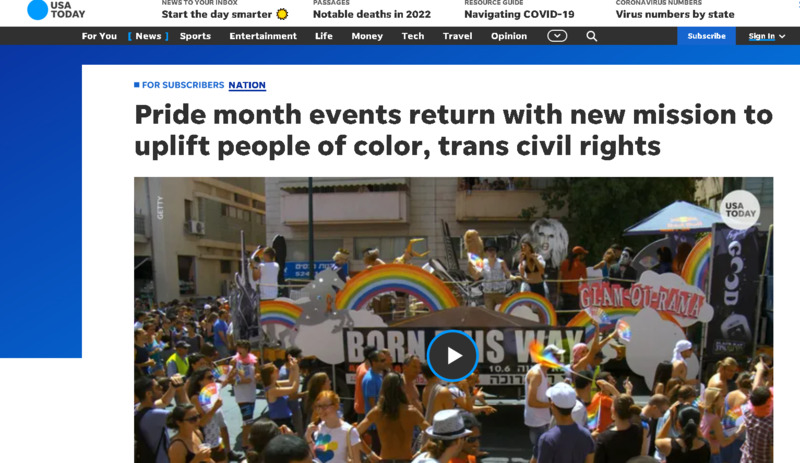 2022-04-19
2022-04-19Pride month events return with new mission to uplift people of color, trans civil rights
This is a news story from USA Today by Bill Keveney. Pride parades will be returning to full-scale since 2019. With the events that happened during COVID, some changes have been made in how it is celebrated. For 2022, more people of color and trans people have been added to leadership positions. Participation is also going to be more accessible for disabled and low-income as well, by making some events online for easier access. Police brutality will also be addressed due to the Black Lives Matter protests of 2020. Seattle Pride has banned police from Pride. Along with this, there is also the theme of speaking out against the anti-LGBTQ legislation that is happening across the United States. -
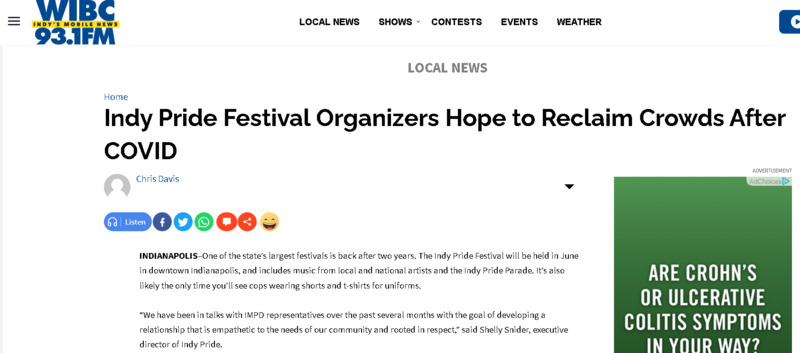 2022-05-13
2022-05-13INDY PRIDE FESTIVAL ORGANIZERS HOPE TO RECLAIM CROWDS AFTER COVID
This is a news story from WIBC by Chris Davis. According to the article, the Indy Pride Festival will be back after a two year hiatus due to COVID. The event will be held Indianapolis. Since the hiatus, some changes have been made. Cops at Pride will be in softer uniforms to make them more approachable. This will include shorts instead of the standard pants. There will also be police on bicycle patrol during the event. Shelly Snider, an executive director of the parade, says that the goal is to help queer people feel safe from major incident, but understands the rough relationship queer people in the past have had with the police force in general. -
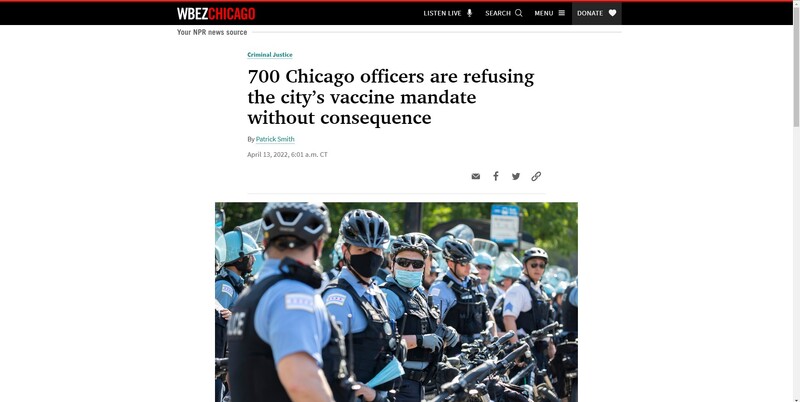 2022-04-13
2022-04-13700 Chicago officers are refusing the city’s vaccine mandate without consequence
This is a news story from WBEZ Chicago by Patrick Smith. This story is about 700 police officers in Chicago refusing to comply with the vaccine mandates. Chicago Mayor Lori Lightfoot promised that officers refusing to abide by the mandate will face consequences by being placed on a no-pay status. Figures from the Chicago Police Department show that almost no officers have faced consequences for refusing vaccination. In total, the number of unvaccinated cops in Chicago is 2,110. -
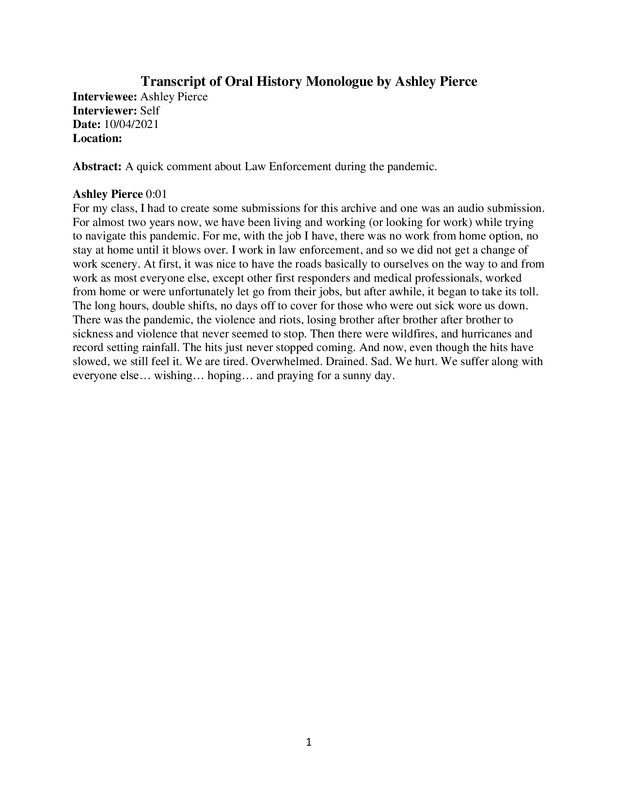 2021-10-04
2021-10-04Ashley Pierce Oral History, 2021/10/04
A quick comment about Law Enforcement during the pandemic. -
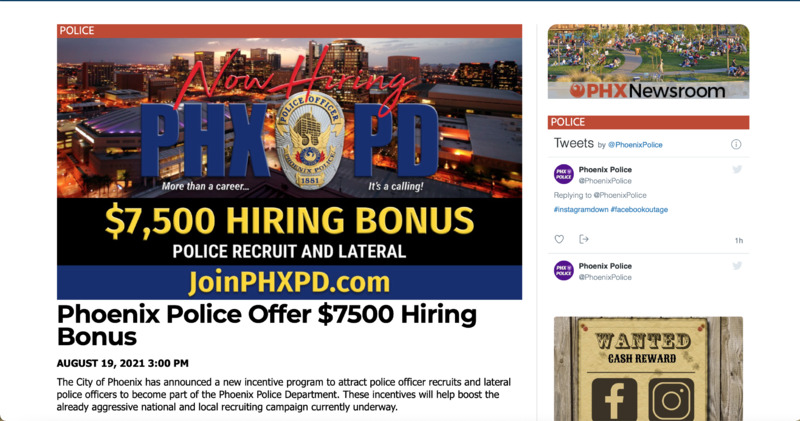 2021-10-04
2021-10-04Show me the money
Working in law enforcement the past few years has been tough. So tough that many are reconsidering the career and either leaving or just not applying in the first place. So many agencies, including my own are now offering hiring incentives... and each agency is trying to offer better than the others to entice people to hire on. It has turned into an incentive frenzy... -
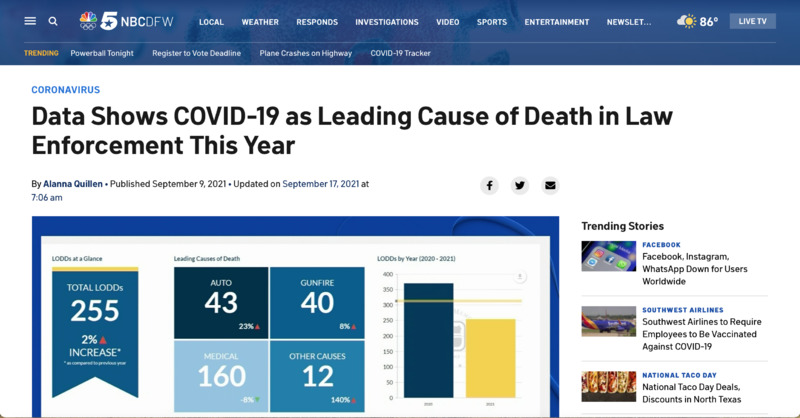 2021-09-17
2021-09-17Sobering Statistics
Once again, Covid-19 tops the list for Law Enforcement In Line of Duty Deaths, just as it did last year. Now, more than ever, Law Enforcement needs our support and assistance! -
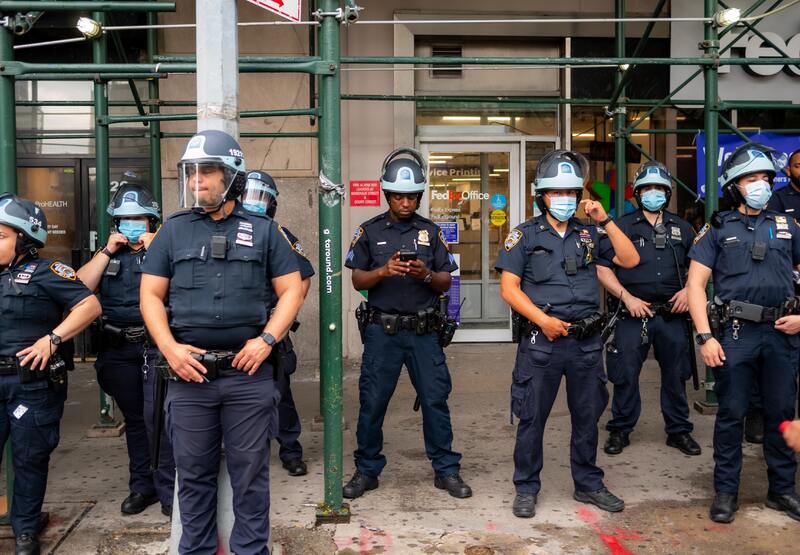 2021-04-26
2021-04-26Image Submission for LE Collection Call
[1] This copyright-free image, courtesy of pexels.com, shows Corporal S. Brantley from the Wheeling (West Virginia) Police Department monitoring a protest. [2] This copyright-free image, courtesy of pexels.com, shows officers from the New York City Police Department, some of whom wear COVID face masks, beneath scaffolding on a sidewalk. -
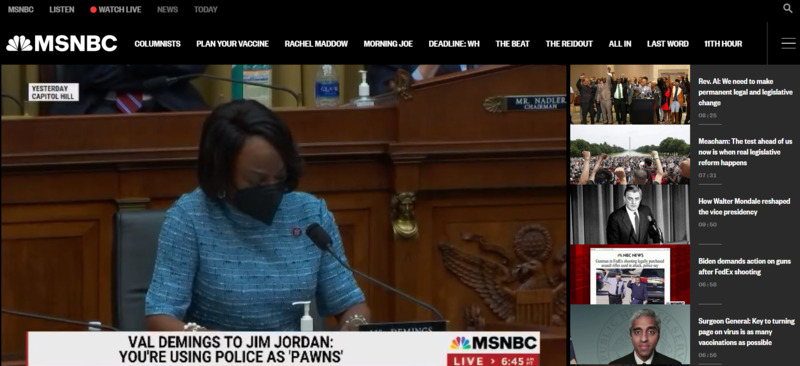 2021
2021Rep. Demings on exchange: Let's stop playing these political games
Rep. Val Demings, D-Fla., discusses an exchange at Tuesday's House Judiciary Committee hearing on a hate crimes bill with Jim Jordan, R-Ohio. -
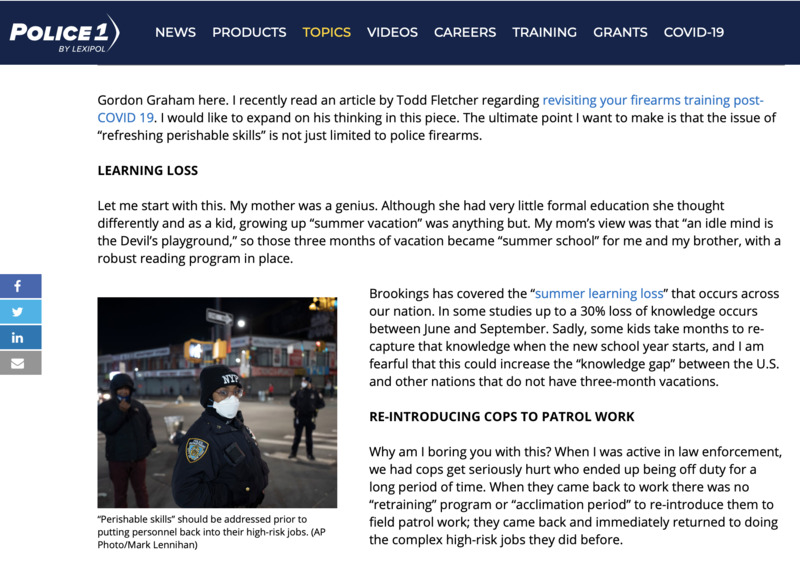 2021-03-10
2021-03-10Op/Ed: How to get officers back up to speed in a post-COVID world
In this article, retired California Highway Patrol Lieutenant, attorney, and professional risk manager Gordon Graham discusses the factors police agencies should be considering and planning for as we hope to soon begin transitioning to a post-COVID/post-pandemic world. Among these are traditional and analogous considerations agencies have long dealt with, such as the return of employees from extended military assignments or recovery from injuries. Many of the finely honed skills that helped keep officers and the public safe prior to February 2020 will have eroded from a lack of use, and it will be incumbent upon agencies and officers alike to undertake these returns to normalcy with serious and deliberate caution. -
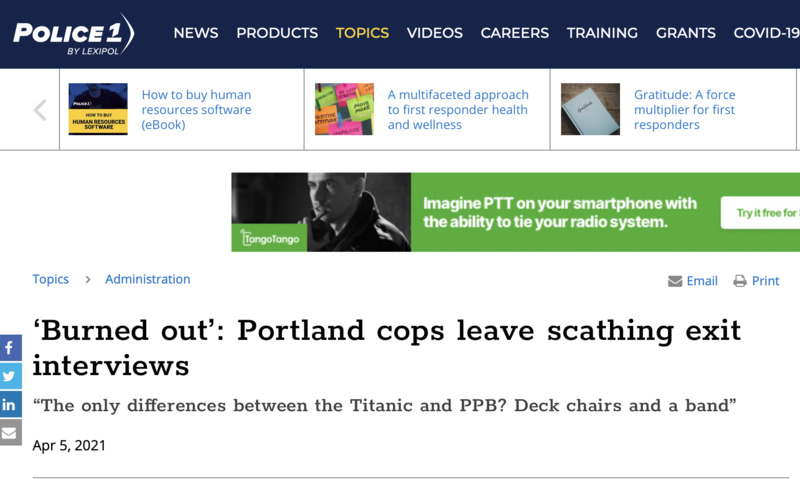 2021-04-05
2021-04-05Online Article: ‘Burned out’: Portland cops leave scathing exit interviews
This article from Oregon Live/The Oregonian was picked up by Police1, and it discusses a number of exit interviews that retiring and resigning Portland Police Bureau officers, detectives, and administrators left during the past year. Of particular interest is the section that discusses the story of Jaykary Jackson: "Young officers of color have left, including Jaykary Jackson, who went to Boise, and Elise Temple, who was one of the Police Bureau’s recruiters. Temple declined to comment on the record. Jackson didn’t respond to messages but he was one of the officers who spoke out last summer about being on the front line of racial justice protests as an officer with the Rapid Response Team. A graduate of Portland State University who joined the Police Bureau after working for Nike for 10 years, he said then that he became a cop because he “wanted to make the most out of my life by helping others.” He also was following in the footsteps of his father and aunt. But Jackson said he was disgusted by the hatred he and other officers faced while standing on the police lines. He got hit by an explosive one night, felt tingling in his fingertips and heat from the device, and got berated by young white protesters. Often when he tried to talk to someone of color at the protests, he said, “Someone white comes up and blocks them and tells them not to talk.” Or yells, “Eff the police ... don’t talk to him.” He left shortly after he was named to be a new community engagement officer." The article illustrates the additional concerns that officers in major cities and law enforcement agencies face, especially when their civilian oversight overwhelmingly seeks to placate protests with emotional vindication in lieu of reasoned, rational, and planned reforms. -
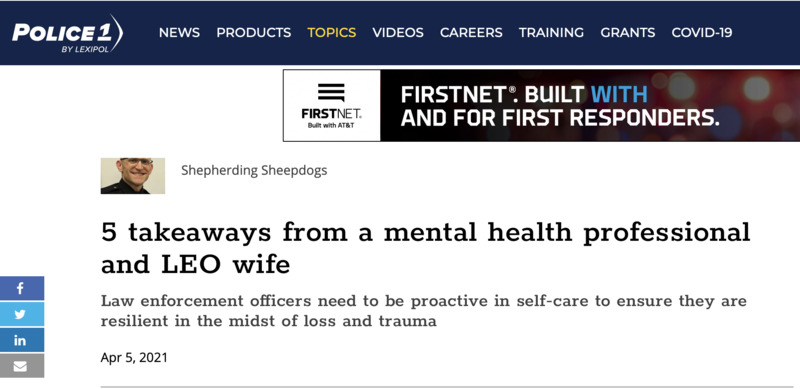 2021-04-05
2021-04-05Online Article: Law enforcement officers need to be proactive in self-care to ensure they are resilient in the midst of loss and trauma
This article discusses guidance for law enforcement professionals to adopt better self-care practices through this pandemic and the increased volume of vicarious trauma, depression, anxiety, and suffering prevalent in our societies. The author specifically addresses the problem of police suicide, which is often committed at similar rates to military combat veterans. While the article's content helps officers potentially deal with the difficulties of their calling, it might also help the public better recognize the darker and unwelcome realities of police work. -
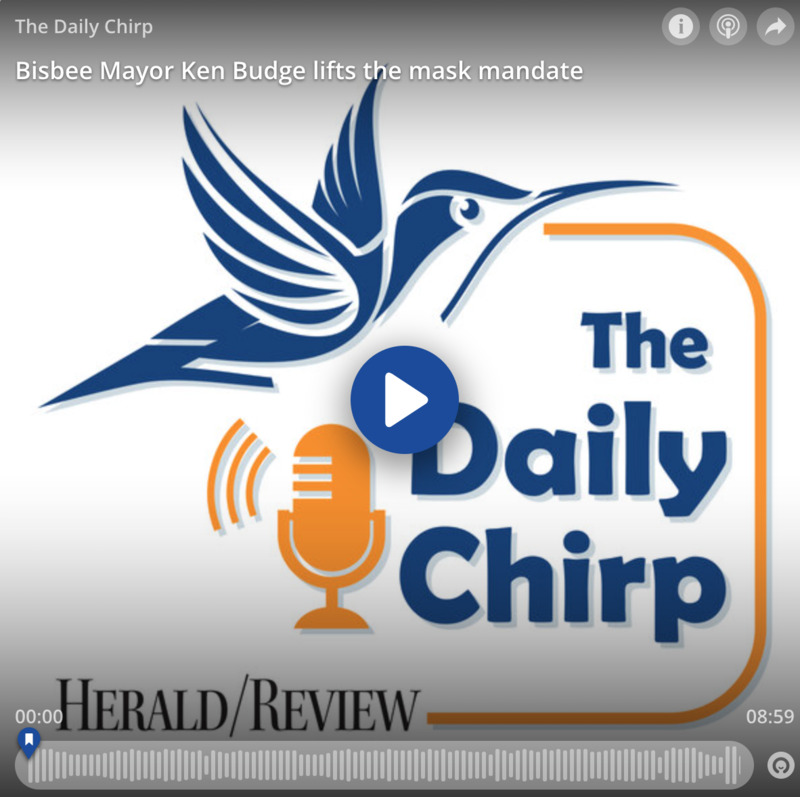 2021-03-29
2021-03-29Bisbee (AZ) Mayor Ken Budge Lifts Mask Mandate
This March 29, 2021, episode of The Daily Chirp podcast from the Douglas Herald discusses Bisbee Mayor Ken Budge's recent retraction of mask mandates in that community -
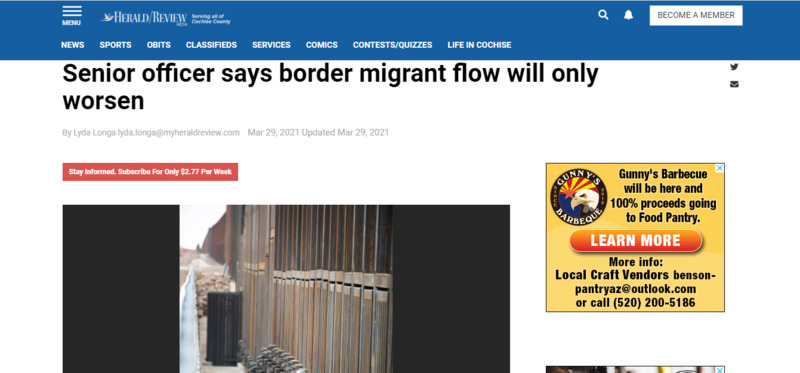 2021-03-29
2021-03-29Senior Border Patrol officer says border migrant flow will only worsen
"Senior officer says border migrant flow will only worsen" By Lyda Longa, lyda.longa@myheraldreview.com, Mar 29, 2021 The situation with undocumented migrants flocking to the Southwest border of the United States from Mexico is only going to worsen, a senior Border Patrol agent warned Friday. The agent, who spoke to various media outlets during a conference call, said at least 380,000 undocumented people had been apprehended at the Southwest border in February and the numbers would be higher for March and beyond. The agent spoke on background with the agreement that media would not reveal his name. “I fully expect to see the numbers increase as we go into the summer months,” the senior agent said, concerning migrant crossings. In Cochise County that warning has begun to bear out near Douglas and in Willcox, where the already stretched-thin Border Patrol is arresting more single adults attempting to slip into the country or taking in and processing children who are flocking to the border unaccompanied. Douglas Mayor Donald Huish said Friday the latest information he received this week from Border Patrol agents at the station just outside Douglas is that they’re confronting and repatriating about 100 single adults daily who are trying to slip in illegally. “They are getting closer and closer to town,” Huish said. What concerns Huish even more is that Border Patrol agents from the Douglas station are being pulled out to help in busier areas such as Yuma and Tucson. “They’re siphoning them off to the western part of the state and leaving us with a skeleton crew,” Huish said. In Willcox, Mayor Mike Laws said he was told two weeks ago by the Border Patrol there were 54 unaccompanied children at the Border Patrol station. “That was two weeks go. Who knows now?” Laws said. “The station can only hold up to 81.” Laws said he was told by Border Patrol that a “third party” has been arriving at the facility and taking 10 to 20 children to Phoenix by via bus. The mayor said he does not know how often the transportation comes or who the third party is. “We have not seen anyone (undocumented migrants) running the streets so far,” Laws said. “All we have is the youths, but we don’t see them either.” Laws and Sierra Vista Mayor Rick Mueller said citizens in their respective communities would gladly help the undocumented migrants but there aren’t enough resources available to do so. Laws, Mueller and other mayors in Cochise County signed a letter recently asking the federal government for help with the matter. Last week, the town of Gila Bend, which has a population of about 2,000, declared an emergency after Border Patrol agents dropped off a group of migrant families with children in a park. Gila Bend Mayor Chris Riggs told reporters he and his wife ended up using loaned vans to drive the families to the Phoenix Welcome Center so they would have a safe place to stay. Riggs said Border Patrol agents told him to expect more of the same. Mueller said there have been no such issues in Sierra Vista, but he is worried that the municipality, if hit with something similar to what happened in Gila Bend, would have no resources to offer. Last week Arizona senators Kyrsten Synema and Mark Kelly announced they’ve been pushing for more federal resources to help Arizona cities with a sudden influx of undocumented migrants. The senators helped secure at least $110 million from the Federal Emergency Management Agency as reimbursement to cities that assist migrants left within their jurisdictions. Also last week, Arizona Gov. Doug Ducey and Florida Senator Rick Scott — who sits on the Homeland Security Committee — called on President Joe Biden and Department of Homeland Security Secretary Alejandro Mayorkas to visit the Southwest border. Ducey and Scott, accompanied by a handful of law enforcement and other elected officials, had toured a portion of the border near Douglas. At his first press conference on Thursday since taking office in January, Biden said he would come to the border soon, but thought a visit now would deflect attention from the issue at hand. The senior Border Patrol agent who spoke Friday, meanwhile, said 300 Border Patrol agents who work along the northern border of the U.S. have been “mandated” to the Southwest border to assist with the influx of migrants. He said about 2,000 family units out of the 6,000 who are trying to cross daily are being processed in Texas by the Border Patrol. The agent revealed that unaccompanied children are being kept in Border Patrol facilities longer than the 72 hours established by law because too many are showing up and agents are overwhelmed. “They’re keeping them a few days, sometimes up to a week,” the senior agent said. Once an unaccompanied child is encountered, Border Patrol contacts the Department of Health and Human Services. The latter makes arrangements for the migrant children to be taken by the Office of Refugee Resettlement. The agent also mentioned an increase in the criminal element among undocumented migrants. “The threats we see are significant,” the senior agent said. “We have seen criminal (undocumented migrants).” Additionally, he said that COVID testing for migrants is only being done in facilities in Del Rio, Texas, and soon in the Rio Grande Valley in Texas. Other than that, testing is being undertaken by non-governmental agencies that are helping the migrants and U.S. Immigrations and Customs Enforcement officials. He said it was probable that some migrants with COVID-19 may have been released into communities. -
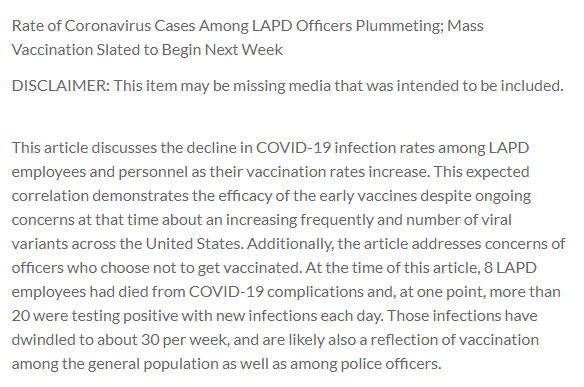 2021-02-24
2021-02-24Rate of Coronavirus Cases Among LAPD Officers Plummeting; Mass Vaccination Slated to Begin Next Week
This article discusses the decline in COVID-19 infection rates among LAPD employees and personnel as their vaccination rates increase. This expected correlation demonstrates the efficacy of the early vaccines despite ongoing concerns at that time about an increasing frequently and number of viral variants across the United States. Additionally, the article addresses concerns of officers who choose not to get vaccinated. At the time of this article, 8 LAPD employees had died from COVID-19 complications and, at one point, more than 20 were testing positive with new infections each day. Those infections have dwindled to about 30 per week, and are likely also a reflection of vaccination among the general population as well as among police officers. -
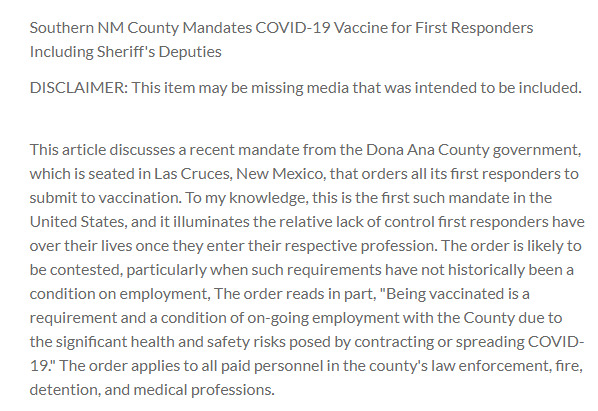 2021-02-02
2021-02-02Southern NM County Mandates COVID-19 Vaccine for First Responders Including Sheriff's Deputies
This article discusses a recent mandate from the Dona Ana County government, which is seated in Las Cruces, New Mexico, that orders all its first responders to submit to vaccination. To my knowledge, this is the first such mandate in the United States, and it illuminates the relative lack of control first responders have over their lives once they enter their respective profession. The order is likely to be contested, particularly when such requirements have not historically been a condition on employment, The order reads in part, "Being vaccinated is a requirement and a condition of on-going employment with the County due to the significant health and safety risks posed by contracting or spreading COVID-19." The order applies to all paid personnel in the county's law enforcement, fire, detention, and medical professions. -
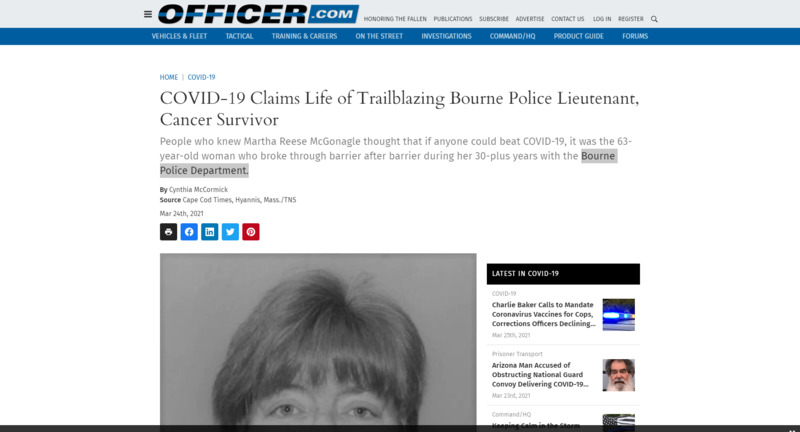 2021-03-24
2021-03-24COVID-19 Claims Life of Trailblazing Bourne Police Lieutenant, Cancer Survivor
The COVID-19 pandemic continues to affect law enforcement personnel far more than all other job hazards. The SARS-CoV-2 virus killed more American police officers and law enforcement personnel in 2020 than any other cause of death, and that trend appears to continue in 2021. Unlike most other essential workers, law enforcement professionals cannot reliably keep social distance or avoid personal contact with the public and their colleagues. Additionally, they are unable to seek reasonable accommodations that would allow them to do so, and their failure to fulfill their duties and sworn obligations is often grounds for dismissal and decertification. -
 2021-03-21
2021-03-21Oral History: Interview with Anonymous Peace Officer #2
James Rayroux 0:01 My name is James Rayroux, and I'm a graduate student in global history at Arizona State University, and I'm working as a curation intern with the "Journal of the Plague Year" COVID-19 archive. Today is March 21, 2021, and it's just after 8:12pm or 2012 hours here in Arizona. I'm speaking with a narrator who wishes to contribute to the COVID-19, archive anonymously. Sir, I first want to thank you for speaking with me and contributing to this COVID-19 archive. Do you consent to having this interview recorded, transcribed, and immediately posted to the "Journal of the Plague Year" COVID-19 archive, where it will be made accessible to the public? Anonymous Officer 0:43 Yes, I do. JR 0:44 Thank you again for agreeing to speak with me and making time for this interview. In lieu of your name, or location, can you provide a summary of your background and professional experience in law enforcement? AO 1:01 Sure, I've been sworn law enforcement for almost 23 years in a state in the Rocky Mountain region. I've worked both for municipal and state government, and I work for small to medium sized agency now about 35 sworn officers. I'm a military veteran, I was US Navy prior to my time prior to going to the police academy, and I worked a variety assignments from patrol to drug and alcohol enforcement, auto theft Task Force, Joint Terrorism Task Force, supervision, criminal investigations, and command. JR 1:44 During that time what are some of your most prominent or important achievements within the law enforcement profession? AO 1:54 You know, I think that this profession, namely, is typically not about the individual. I would probably point towards successes in the community and successful team building and successful growth of individuals into the business. I think one of my most proud achievements I think, something I'm tremendously, I feel tremendously accomplished for is somehow I failed to convince my son to be a firefighter, and he was just sworn in at another municipality in the same state as a sworn law enforcement officer. So while I have failed him and trying to convince him to do literally anything else, I'm also extremely proud and accomplished that I have raised my son into a similar professional lineage, and he's elected to take the oath to protect his community, as well. JR 2:57 What are your current roles or assignments within your organization? AO 3:04 I'm currently assigned as a patrol supervisor, a watch commander. I supervise a shift of a number of police officers and currently working day shift. So in those roles, I'm essentially the emergency manager for our smaller community, supervise police response to emergencies, meet with the public, interact with command staff, meet with public stakeholders, and then, essentially, a customer service rep who happens to be a sworn law enforcement agent. JR 3:37 When and how did you learn about the SARS-CoV-2 virus in early 2020, and what were some of the first conversations you remember having about it at work? AO 3:51 So COVID became on the tip of everybody's tongue probably in early January. And previously, in the end of 2019, it was somebody else's problem. It was, it was a China problem, it was a Wu Han problem, specifically. It was, it was out of sight out of mind. And, of course, you'll know this about law enforcement, there's only two kinds of problems in law enforcement, those being "my problem," and "not my problem." And during the first part of 2020, it wasn't our problem. There was a limited amount of cases in the US, they trickled in. Most of what we understood about the virus that causes COVID-19 was based on the media, was based on, you know, what you might catch a snippet of on NPR on Fox News, which has no news about foxes, I might add, and essentially, just the snippets we would get on the media and I don't remember having official tangential conversations about the COVID-19 virus in a strategic way, until probably February. A lot of those initial conversations, you know, as, as trained observers and trained investigators, I know many, many law enforcement officers who don't immediately give a lot of trust or credence to things their government tells them. So, for the first little while, it was kind of an attitude of scrutiny, one of a lack of credibility. We weren't really sure whether this was hype and whether there was really any risk, and there was a lot of conversations about the corollary between, you know, the standard flu and other illnesses that killed just as many if not more people, and there was a lot of disagreement about their trajectory, and the volume, and the scope, and really how this thing was going to manifest. JR 6:04 How did your agency first deal with the COVID-9 pandemic in an official way? AO 6:12 The first steps that were taken initially, mostly just surrounded, strategic outward facing changes to how we did business on the street, basic social distancing, wash your hands, don't touch your face, basically just mimicked CDC advice. You know, be careful more to come. Very low level, very basic, no real operational changes, no testing, no recommendations for symptoms that was, you know, under the umbrella of "flatten the curve," keep yourself healthy sort of jargon, that was shared from both the government and from the administration of our, our small community downwards towards the police department and other, other trades in the region. JR 7:13 What did your first pandemic briefing or roll call look and feel like after those changes were made? Where you and your squad entirely in masks for that first time, or was that yet to come? AO 7:29 When the government of our state first mandated masks, there was specific legislation that excluded law enforcement. It was quickly decided that masks were recommended, but were not required initially. So there was this sort of juxtaposition and feeling out period in our community where not a lot of people wore masks. It was recommended. You were supposed to wear them when you were outside, you were supposed to wear them, you know, when you were in contact with others. The science hadn't really been affirmed. There weren't a lot of links to credible research yet. And, of course, a pandemic of this nature has never been experienced or dealt with for generations previous to this. And so, you know, I'm 100% cofident telling you that literally everyone was just winging it, and that was immediately apparent in that first briefing where we discussed what we were going to do. Still scrutiny, still somewhat lack of credibility, lots of, lots of eye rolling with a few critical and strategic thinkers, you know, raising, you know, what would later be the first semblance of some alarm, saying, "Hey, you know, maybe, maybe this is going to be a big deal. Maybe we haven't experienced anything like this before, we ought to be as careful as possible." JR 9:03 How did your agency's policies and procedures change over time after that initial effort? AO 9:13 So the, you know, the, the tide came in, in a big way very quickly. And as you'll remember, as the COVID-19 virus, sort of sieged Italy and New York and the Eastern Seaboard, everybody started paying attention in a big way. And we're, you know, a couple 1000 miles from there, but local and state governments started reacting very, very quickly. Masks were mandated for all persons in contact with the public. A scramble was afoot to obtain PPE [personal protective equipment], which supply chains being, you know, any resemblance of the way they were in 2019, there was no problem. You just got on Uline or Amazon or, you know, you know, whoever your main commercial supplier was, and you ordered them by the skid and PPE was readily available and there was no reason to hoard it. But all of a sudden, there weren't any. There wasn't any, the supply chains were just curb-stomped into this sort of perpetual waiting period where nobody was sure what they were going to need, and everybody thought that N-95 respirators were the new hotness, and everyone had to have some from car dealers to people working the drive thru to baristas to, you know, the guy doing my front end alignment. So all of a sudden, we were trying to balance what was practically happening on the street, what our day-to-day call volume looked like, and what we were really supposed to do with the PPE we had knowing that our resupply was probably distant. And when we wove all that together and put all that minutia in a pot and stirred it up, what we came up with was pretty much this overwhelming sense of nobody knowing anything that was reliable. And it was anybody's best guess how long this was going to last and what we're going to need. That was echoed among our local hazmat [Hazardous Materials responders], our local health departments, our local health organizations. Nobody had any PPE to give us, nobody knew how long it was going to last, and nobody could have any real recommendations except for this sort of parroted, you know, don't touch your face, wash your hands, wear a mask in contact with everybody. Once masks were required, we had some pretty significant changes to the way that we did business in the community. You know, as a forward facing law enforcement agency, we contact, you know, one officer might contact 10s of people every day, sometimes might make 15 or 20 contacts before, you know, the afternoon's said, and by doing so, what we know now to weave a fabric of a contact trace that is essentially impossible. I mean, we remove Degrees of Separation all day long just by talking to people. And none of that technology and contact tracing and science had really entered the social jargon. But we were out there just trying to be as careful as possible, and it wasn't until probably...probably late March is when you know rivers turned to blood and the sky fell as far as the government was concerned. And it was then that definitive, codified changes were made to procedure where there was a moratorium put on traffic enforcement and all proactive street contacts, except for egregious emergency violations. We didn't make traffic stops for weeks. There was a moratorium immediately placed on warrant arrests and on booking people at the jail because, having a potential infectious patient in your vehicle, nobody knew what the consequences of that were or how to decon [decontaminate] it. So we didn't arrest anybody. If it was a crime of violence, or a crime against a person with a victim, we would screen it at the jail first. Everybody warned N-95 mask, and we would transport them as quickly and safely as possible. If it was a warrant for anything nonviolent, warrant for bench warrants, and courts and anything, we just let them go. Even if somebody told us that they had COVID symptoms, or were COVID positive, there was still no viable testing in the system, and no way to confirm or deny that those statements were true so we didn't book them. So many suspects in cases either went uncontacted, cases were dismissed, or the warrants were skipped just because the precautions weren't in place yet, and the agency and all the businesses and other agencies we worked in the region were trying to just to stay healthy. Proactivity probably took a, I think, I would call a permanent shift. I have not seen a resurgence of practice enforcement and the likes of which I might like. Cops just stopped doing business the way that they used to, and some of the badges we'd wear and some of the honor that we took in protecting the community came from making contacts: suspicious vehicle, suspicious people, you know, local transients, patrolling, you know, bike racks and stealing cars and stealing bikes and harassing people and it, it turned into kind of this proactive wasteland where law enforcement was worried about exposing themselves. They were worried about exposing each other. They were worried about exposing their families. And they were worried that if they happen to make a contact, they might expose the next people, the next 10 or 15 people that they talked to that day. So the only way to eliminate that was just to stop doing it. So by eliminating, you know, the patient zero style traffic stops, we hoped to have an impact on that, and flatten our own curves by just not talking to anybody unless it was an emergency. JR 15:38 Do you remember the first call or the first contact that you went on where you and the public were both wearing masks? AO 15:51 I don't remember it specifically. But I remember a handful of contacts that were made in right around March when, you know, when I said that when the king tide came in with news and with panic and fear. And I remember a handful where nobody really was sure what to do. Everybody was, had this sort of weaponized social distance, and people would walk the other direction when you tried to talk to him, and we hadn't mastered the, you know, the little elbow bump or the little nod, and so nobody could figure out how to talk to one another, and there was quite a few instances of the COVID card being played where people just simply didn't want to talk to the police. So they, they feigned fear and panic for exposure and wouldn't come out of their homes and open their car doors or their windows. And then shortly thereafter, it became socially stigmatic to participate in the fear and panic. And if law enforcement didn't wear masks, we sort of became this pariah immediately. So it was, it was optional for a very short period of time, but then very, very quickly, virtually every single contact we made had to have a mask on, of course, which, you know, brings with it all the problems associated with not being able to see somebody's face. It's hard to hear, it's hard to talk on the radio. It's hard to smell intoxicants, you know, it just added sort of this, it was basically like dimming the focus one click on your whole world by having to cover your face. But, you know, at that point, some of the science was starting to become more consistent and more published, and every, most everybody at that point was pretty convinced that at least when in contact with the public and the unknown, that some sort of mask was viable and necessary. JR 17:50 In Western society, handshaking has long been a very important social event. And that's obviously gone by the wayside with the general public since the pandemic began. In lieu of having that physical contact to make direct human connections, how have you tried to establish rapport with the public when you do have to contact them? AO 18:21 It's been weird. You know, handshakes have been sort of the status quo of a show of respect and humility for so many years. I mean, you know, you hold your hand out, it's almost instinctual. It's almost primordial. You know, in this culture in Western culture, someone holds your hand out, and you don't take it, like, them's are fighting actions, right? So it's, it was weird. We had to figure out ways to break the ice, we had to figure out ways to do that acknowledgement, and I'll answer it two ways. The first way was we had to figure out how to communicate with people even though they couldn't really see our faces, and there could be no sort of context to breaking sign of respect, like the handshake. So you know, you come up with this weird elbow bump, or you give the little, you know, the little nod that one bro gives to another across the urinal, and you find out ways to just break the ice with people. And the second challenge that we experienced was that we could no longer show those signs of respect to one another in view of the public. So if one cop was touching another, or, you know, giving a little handshake or playing grab ass, or high five, or even just a fist bump, all of a sudden, we were cast out, right? All of a sudden, those little, that that lack of social distancing became this socially virtuous thing to exploit and to ridicule, and so we had to be exceptionally careful in public even though within shifts, we considered our shifts to be close contact circles. I mean, any sworn law enforcement officer working during the COVID shutdown very likely saw their shift mates more than they saw their blood families. And so there was just no way to socially distance internally at work, because of the, just close knit manner in which the job is done and the proximity we had to one another throughout the day. Yet in public, you know, we're in our own cars we're socially distanced, we got to have masks on, you better boil yourself between each contact, and you got to wear booties and a Tyvek suit and touch everybody with a little wand. And in the mix, I feel like our isolationism increased, and I feel like our bonds of society from a law enforcement perspective became even more tenuous. So, you know, one of the things I adopted was I started using my first name with everybody. I stopped using rank, I stopped using identifiers. I just told him who I was. I asked them for their first name, I use my first name, I tried to break it down. And I would always, you know, have these little catch conversations I do and I introduced everybody, and just try to acknowledge that this is a new time and, you know, you hear in the media and you see it a lot. And in every, every, you know, corporation, commercial for six months, it was, "in these trying times." So, that sort of became the catchphrase like, "Hey, in these challenging times, things are different. Here's the business I'm here to do. My name is so-and-so. We're trying to keep the peace, how can we be helpful?" And we interacted with all kinds of people. Some people thought it was a hoax. Plenty of, plenty of sovereign citizen scam-demick, plan-demick jargon being thrown our way. And then on the other side of that spectrum, were extremely scared, extremely isolated...people wouldn't come out of their houses, people were afraid to take a Grubhub delivery. People were, you know, boiling their utensils. And somewhere in the middle, law enforcement just kind of figured out a way to break the ice, and I think it's, I think it's going to be permanently different. And I can tell you that because the day before yesterday, I was on a burglary call where I talked to the informant. Without even thinking, I reached my hand out to shake his hand because he told me his name. He said, "Hey, thanks for coming. I'm so and so." And without even thinking about it, my mammal brain shot my hand out in a greeting. And it took him about five seconds of staring at me before I figured out that we just don't do that anymore. And it's super weird, but we, we're working around it. JR 22:51 What do you miss most about your job or your daily work duties from 2019? AO 23:02 You know, I don't know if this is going to be directly related to the pandemic. I think that in 2019, we were dealing with a community that understood what the rules were. Everything was, you know, we call it "pre-COVID," we call it "olden days," I don't know if we're ever going to return to those times, but cops are out there doing business in the community, and we were fighting crime and protecting people. And we were making this self sacrifice and serving our community and being forward facing and just eatin' meat and just leaning in just to get business done. And we did it no way that served our customer and served our client base. And I don't know any law enforcement officer who's been on the job for more than 10 minutes who doesn't do this because they love the community they work, or they love the service that they provide, or the people they protect. And I think we've permanently changed the way that law enforcement officers are viewed by their communities. I think we've done, and I say "we," I mean we as a culture, good, bad, or indifferent, have done irrevocable damage to the reputation of law enforcers in our community and the public trust that they must hold in order to be successful. And then all of a sudden, the communities "why nots" became really, really strong. And cops had to start making excuses really quickly about why we weren't the bad cops. And why we weren't doing this to violate your civil rights. And why we're just, we're just out there trying to do the job and just trying to, you know, serve policy and serve the constitution and it might not be about you and your mask. And I feel like this stigma, the social stigma became leveraged against law enforcement in a really big way without any real underlying facts. No one, you know, it just became this sort of socially virtuous stigmatic status to hate the cops, whether it was for their efforts to preserve the public peace in the pandemic, or whether it was your interpretation of their worth based on events taking place in the national landscape. It became cliche to hate the cops. And I think I miss, I missed the real relationships we had in 2019 that were based on sort of a shared respect, and a common understanding and actual virtues of character and integrity. And now, you know, it's, it's an uphill climb. We're sort of this Sisyphussian rock-pushing force, just always trying to push this public opinion and public trust rock up the hill only to, you know, take two steps back, and I miss that quite a bit. JR 26:15 What do you wish that the public understood about law enforcement during the COVID-19 pandemic? AO 26:27 I think if I could choose one thing, I wish that the public understood that nothing changed in the way that law enforcement supports and loves and wants to collaborate with the community. During the pandemic, law enforcement was shined in three or four different colored lenses varying from, you know, rosy to catastrophic, and most police officers on the street during the pandemic, were humans just trying to figure out how to navigate their space and provide for their families, and to continue to protect the public and somehow navigate shark infested waters of this, the sudden unknown COVID-19 enemy. And it was a huge struggle, you know, policy was changing on the daily. Science and procedure was being released several times a day at, you know, at its busiest, and most law enforcement were just caught in the wake of this rapidly changing information, hugely volatile work environment, and trying to keep themselves and their families healthy while still being effective. I wish the public knew how much most law enforcement officers hate racism and prejudice and corruption. I wish they knew that nobody hates dirty cops more than we do. And that virtually all the law enforcement officers they contact on the daily are still doing the job because they've considered the risks to their lives and their risks to their health and the risk to their family's health, and are still willing to suit up every morning or every night, and put body armor on, and put 30 pounds of gear on, and go out there and risk their health and safety to protect our community, and mostly people they don't even know and have never met. And I think that's what's really at stake when the rhetoric gets really loud and the disinformation gets really deep. And the panic and the fear really starts to grab older people is they start to lash out against the government as a whole and what they don't understand in, you know, in some way is that that uniform represents just another member of their same community who is trying to stand between the two entities and make good decisions, and protect the constitution and uphold the peace and protect the, you know, the victims and protect, you know, the weak from the oppression and you know, all the things we stand for. But all those cops out there are just the same community members. Some of them don't have any toilet paper at home. Some of them couldn't buy peanut butter. Some of them didn't have fresh food for weeks because they couldn't go to the grocery store because of their shifts. So it wasn't that there was this divide. It wasn't that there's this this pantheon of law enforcement officers who were out there trying to screw everyone, it was members of the very same community who just happened to put that uniform on by choice to save it and protect the community despite the fact that there was this, you know, this crazy pandemic and all the fear and panic going on at the same time. JR 29:56 Knowing that I intended to speak with you about law enforcement and your experience in that profession during this pandemic, what, perhaps, was one of the questions that you hoped to answer or that I didn't ask? AO 30:18 One of the things I was thinking about talking about was that, for the first several weeks, I would say maybe even two months, there was no viable testing for any first responders in our region. So if one of my guys or gals was symptomatic, they simply had to be quarantined, and there was no way to test. We begged and borrowed and pled, and, you know, by hook or by crook, tried to figure out how to make a relationship with a clinical entity so that we could protect our people and keep them in place and keep them effective and keep them assigned on the street. What happened was any flu-like symptoms were just viewed as COVID quarantine, and so there was a couple of days there where I almost didn't have an emergency dispatch center because I didn't have anybody to work. There was a couple of days where we were hemorrhaging overtime money paying the cops that were healthy to cover the cops that were not because we couldn't get them tested. It took quite a while until we had a viable, and until the turnaround was fast enough that it was sustainable to test people. Because if the turnaround was 10 days, and the quarantine was 14 days, and almost was you know, half a dozen, six of another, you were gonna stay home anyway. So until the testing was fast enough and efficient enough, we burned a lot of time, and a lot of cops sat at home for 14 days under quarantine who maybe didn't mean to, and there was no way to test them. Once testing was viable, and available, I feel like we did a better job of that. But at the beginning, there were several of us who were pretty sure we had contracted the virus and suffered its effects as early as January or February, a ton of us were sick in January and February and early March before, way before viable testing was available in our communities. And that was, that was a challenging and an alarming period of time where even my first responders we just didn't know. And if you weren't admitted to the ER, if you weren't seen clinically, and if you didn't have co-morbidities or other risk categories, you just didn't get tested because the resources didn't exist. And why would we waste a test on a first responder who can just quarantine for two weeks and be otherwise healthy when we need to use it on, you know, the septuagenarian co-morbid patient who's, you know, got 15 different ailments, and I understand that math. But it was pretty frustrating to just have to hemorrhage overtime money and just suffer and figure out how to cover shifts and work 16, 18 hours in a row because there just wasn't anybody else. JR 33:23 I am incredibly grateful for your time and for sharing your expertise and your thoughts with us. Thank you so much. AO 33:31 You're very welcome, sir. Thank you for the opportunity. Transcribed by https://otter.ai -
 2021-03-20
2021-03-20Oral History: Interview with Anonymous Peace Officer #1
James Rayroux 0:00 My name is James Rayroux. I'm a graduate student in global history at Arizona State University, and I'm working as a curation intern with the "Journal of the Plague Year" COVID-19 archive. Today is March 21, 2021, and it's just after 5pm or 1700 hours here in Arizona. I'm speaking with a narrator who wishes to contribute to the COVID-19 archive anonymously. Sir, I first want to thank you for speaking with me and contributing to this COVID-19 archive. Do you consent to having this interview recorded, transcribed, and immediately posted to the "Journal of the Plague Year" COVID-19 archive, where it will be made accessible to the public? Anonymous Officer 0:39 I do. JR 0:40 Thank you, I greatly appreciate you making time to share your experience with us. In lieu of your name and city, can you provide me with a summary of your background and professional experience in law enforcement? AO 0:57 Yeah, I've been a sworn police officer for a little over 10 years in northern Colorado. I've worked for a couple different departments during that time. I started off at a small municipality, and at one point worked for a state law enforcement agency and then working for a municipality that has approximately 150,000-160,000 citizens within the jurisdictional limits of our department. JR 1:25 Can you give me a summary of your life before law enforcement and what led you to police work? AO 1:33 Yeah, so I grew up with a family of cops, a grandfather and two uncles who were police officers, so I'd always kind of had that in the back of my mind. When I was a teenager, I started working out with an alcohol and tobacco compliance team. So I would go in and attempt to buy tobacco and alcohol products underage to ensure that corporations were properly ID'ing the people who came in to buy those products. I studied criminal justice a little bit in college, although that's not what my degree's in. I went to a police academy and then worked at the departments that I previously mentioned. And then within the realm of police work, my emphasis has mainly been of a traffic safety, impaired driving nature, so that's where my expertise kind of lies within the realm of police work. JR 2:38 What are some of your professional goals over the next few years, and where would you like to, what would you like to accomplish before the end of your career? AO 2:50 My sights in the next couple of years, I'm currently working on a master's degree in organizational leadership. With that degree, I would like to promote within my department to at least the rank of sergeant. And like I said earlier, I work for a larger department. Previously, I came from smaller departments, and I kind of missed that small town feel, so eventually, I'd like to parlay that supervisor experience in my larger department into being a supervisor at a smaller municipality or a smaller county agency where I think I could bring both sides of working for a small agency as well as looking at working for a large agency to help a smaller agency, because they don't usually get a lot of super qualified candidates for the higher positions. It's kind of what is already at the department, which sometimes is great, and sometimes it's not so great, and I think that having somebody that just hasn't came up through that agency to bring some new kind of fresh ideas is really good for us. That's ultimately the goal. JR 3:58 And when and how did you first learn about the SARS-CoV-2 virus in early 2020? AO 4:08 Initially, I heard about it on the news, broadcast news, and then I visited enough websites, mainly Reddit, which is often called "the front page of the internet" that kind of started talking about it and how it was kind of on the West Coast. Obviously, Northern Colorado is more westerly in the US, than, you know, the middle of the country, and Denver, our biggest city in Colorado, obviously has an international airport, and there's lots of things that come through, so I kind of kept an eye on it. Also with the nature of my work, I come into contact with people of all different kinds of races, religions, sexes, creeds, orientations, all of that both, willingly and unwillingly, so I kind of kept my eye out and knowing that there could be a good chance that if it came to Colorado that I would be involved with it just because, traffic stops, disturbances, sometimes we have to take people into custody against their will if they have a warrant, or they're fighting us, so that's a really close contact, like hands-on situation. So I knew if it did get worse, I didn't expect to be this bad, but if it did get worse, that it'd probably end up affecting us in one way or another. JR 5:22 Do you remember what some of the early conversations were like that you had about the SARS-CoV-2 virus or COVID-19, what those conversations at work were like or were about? AO 5:36 Yeah, a lot of them were just kind of like, you know, this is just a really bad flu. As long as you, you know, sanitize your hands after you deal with people, which is a pretty common thing that cops do. I know, the majority of cops that I work with carry around a little bottle of sanitizer, either on their person or in their what we call a "war bag," a little bag that sits in the front seat that holds all our tickets and everything else we need for the shift. So it was initially just, you know, be smart. If somebody's sick, keep your distance if you can, wash your hands, sanitize. And then once summer comes in, because early it was spring, where it's still pretty cold here, that once summer comes, the heat will naturally kill it off, and it's not going to be anything worse than the normal flu was initially the talk around town. JR 6:24 How did your agency first deal with the COVID-19 pandemic? AO 6:30 So initially, we got multiple emails, kind of just updating it from what they've heard from the Surgeon General in Colorado that was disseminated to people higher up in the city side of our agency, with just tips, kind of like what I just talked about, wash your hands, you know, don't touch your face or mouth, sanitize your hands, sanitize your cars. And it was just kind of a more official version of what we all kind of thought, which was that it was just a worse flu as long as you, you know, stay at home with your sick, don't voluntarily interact with sick people, etc, etc, that it would be good and we'd be done by summer. JR 7:13 At what point did your agency start encouraging or mandating mask use by employees? AO 7:23 So I want to say early March is when the governor of Colorado put us on a statewide lockdown. So I want to say maybe mid February to late February, is when we got a order to make sure that we're wearing masks, if we're around each other, if we're going to be in somebody's house. They were saying they prefer it on traffic stops, but they know because of the nature of us standing in traffic and it's kind of already hard to hear that, that was kind of our discretion. But I want to say mid to late February was the big one. It's also when we stopped doing in-person briefings. We have a specific briefing room where our sergeants, commanders will talk to us about what happened earlier in the shift, what they expect of us tonight, just conversations about our shift in general that's usually done in a room. It was about that time that we move that outside. So we all just kind of stood outside our police department and ended it to be a little bit safer than being in the booking room. But even when we did that we still wore masks were outside doing our briefing. JR 8:28 What do you remember or what did that first pandemic briefing or roll call look like when everyone showed up in, in masks? AO 8:37 It was definitely interesting. You know, it's just something that you usually don't see unless you're in a hospital setting, which we obviously go to sometimes if we have bad car accidents or bad assaults. But again, even that's usually if the person is thought to have been sick or something else, where you're obviously not standing in the emergency or the surgery department. So it was a little bit different seeing everybody with these, at the time, surgical masks. We ended up getting given cloth masks and everybody eventually started you know, finding a mask they liked better, but initially, it was just paper surgical mask like you see at the hospital, so it was definitely a strange sight to see twenty cops standing around with their mask on. JR 9:23 How have your agency's policies and procedures changed since that initial response in February 2020? AO 9:31 Um, so as COVID kept going up and more and more cases and especially in Colorado, and especially Northern Colorado where there was a higher outbreak than the rest of the state, we got, I don't know the name of the product but it's essentially a super medical grade cleaning product that is so strong that you have to wear gloves and a mask anyway when you're using it because it can burn your hands and you don't want to inhale it. So we are given directives to wipe down everything we touch on our car. So steering wheel, driver-side door handles, radio mics, computers, shifter, etc, with that cleaning product both before and after our shift. And then our department also bought a bunch of small hand sanitizer bottles for everybody to carry with them. And then we had two big jugs in our, what we call patrol room where we type our reports, that we could refill those smaller bottles with. And then we were given a mandate to wear masks anytime we were in contact with somebody. And if we could, any calls that we were, we can, we would normally take in person, such as like a cold theft or something just for customer service reasons, if we're not super busy, we'll usually go to that person's house and just get their statements so they can have a face-to-face contact. We were given a directive, though, to do all that over the phone as much as we can. So there would be nights that just wasn't a busy in-progress night, and I would take fifteen calls, all from my car parked in a parking lot somewhere. So after a decade of doing this, that was a big difference in what I was used to. JR 11:12 For the benefit of the audience, can you explain what a cold theft report is? AO 11:17 Yeah, so a cold theft report is if somebody came home from dinner, and let's say their son, their twelve-year-old son left their bicycle just outside in the front yard leaned up against the house, they get home and that bike was gone. And they don't have any kind of surveillance systems, you know, they weren't home when it happened, so they know that something was stolen, but they have no idea of exactly when, no real description of who might have taken it, and we call that a cold theft. It just means that it's not something that's in-progress. Like if somebody were to call and say, "Hey, you know, there's actively a fight going on right now at the mall." Um, that would be an in-progress call, or a hot call is what some people call it. Anything cold, so a cold theft, a cold burglary, a cold auto theft just means that it's something that's not actively happening, and they don't really have much information to go on. JR 12:05 Thank you. Do you remember what your first inperson call was after you began wearing masks, and maybe your first call after the public started wearing them as well? AO 12:19 I don't recall the specifics of either. I know that there was a couple calls I went to when you know, we were mandated to wear the masks. And you know, police officers still have freedom of speech just like everybody else does. But, you know, working for any organization, whether public, like the government or private, you still follow the rules and policies, procedures of your police department or your, your company. In this case, my police department or my company said that, you know, there's a new policy that we'll wear these masks. So it was weird, because there are some houses we go to where we would talk to people in-person and, you know, they'd be like, "Well, this is dumb. I don't know why you're wearing this mask. This is essentially the flu, why would you wear it?" You know, I'd have to be like, "Well, you know, my opinion on it is irrelevant. At this point, I'm here for a reason, but my boss told me to wear this, and my department told me to wear this, and that's why I'm doing it." And then we get the opposite where we go somewhere, and we would have the mask on and so would they and they're like, "You know what, I'm really glad that you guys are taking this seriously, and, you know, there's a lot of people that aren't." At that point, they're happy so I'm not going to say anything to change it. But you know, we would give people a mask that would ask us. "I'm glad you guys are doing this. Do you think this is as bad as it is?" And I would say, "You know, well, my again, my opinion on it's irrelevant. My boss told me to wear this mask, my department told me to wear this mask, so that's why I'm wearing it. Anyway, how can I help you with the reason that you called today?" JR 13:53 Has the pandemic changed your sense of security around fellow cops or fire crews or EMS personal? AO 14:02 I don't know if it's so much has changed my sense of security. I know it's changed things that we've, we've done things a lot different. It's not uncommon for police officers and my agency or anywhere across the United States to also be dispatched to fire medical calls. And we provide what's called scene security. So firefighters, a lot of them also double as paramedics and EMTs. And obviously EMTs and paramedics are those things. They have a job to do, and that's you know, rescuing people or providing life saving medical intervention on people. And sometimes especially if it's drug or alcohol fueled, there can be other people on scene that are concerned or upset and they want to get involved with it. And so law enforcement will get dispatched to assist with that and make sure that the scene is safe or secure, so that the firefighters and EMTs can do what they need to do. And usually we'd always go to those. It changed a lot where if somebody was COVID-19 positive or had symptoms of it, and it didn't seem like we needed to be there, we would go to a lot less of those just to keep our officers safe and not put them in unnecessary danger. JR 15:11 Has the COVID-19 pandemic affected your process or procedures for detaining, arresting, or booking suspects or arrestees? AO 15:23 Not so much for detaining or arresting, those thresholds are met at certain times, and for various reasons. You know, so I've detain people before that, I don't think are alleged to have committed crime at that point. But because of their general behavior, or things they've said or things they've done it, they're detained from an officer safety perspective, so they can't hurt us, and they don't hurt anybody else. Obviously, I've detained people because I feel like they may flee from us, and, you know, I have a reasonable suspicion that they've committed a crime, and so they're going to get detained until we can figure everything out. So our department is really great about stressing as far as keeping yourself and your partner safe, nothing changes. So whatever you need to do to make that happen is fine. I work for a municipality, so our "booking standards" is what we call them, so what we can and cannot book people for is set by the sheriff of our county, who runs the the jail. Because of the COVID things, and obviously, you get inmates that are together in tight spaces, and there's a lot of them, he relaxed them, and essentially lowered the threshold of crime that it would take. So in Colorado, we have three different classes of misdemeanor with M-1 or misdemeanor-one being the highest and M-3, or misdemeanor-three being the lowest. Same with felonies, there's one through six, one is the highest sixth lowest, he essentially made it where we can't book on any misdemeanor charges for a while, which are the majority of what we deal with, I'd say. And two, we just cite them into court and give them a summons to court to appear in front of a judge to address the charges that they're alleged to have committed. That was different. So I think that was the sheriff's way of trying to control the inmate population so it just doesn't have as many people packed together. JR 17:18 In the past few months, do you suspect or have you thought that, during your interactions, a member of the public or a suspect or even another officer has attempted to use the pandemic or a possible COVID-19 infection to, to alter your interactions with them? AO 17:42 I don't think I've seen that from officers. We have definitely seen it from people that we've contacted on the street, and especially people that still meet those arrestable jail booking standards. We were told by the jail to ask a series of questions before we brought them in. You know, "Have you been in contact with anybody with COVID recently? Have you tested positive for COVID? Have you been out of the country?" There's a bunch more other ones, and it's pretty easy to kind of tell what we're getting at by the directions, the questions go. And we've had people that have been like, yep, I have COVID, my mom has COVID I've been in contact with them. And they think that that's going to make it where they don't go to jail. In all actuality, all it really did was delay that slightly because we had to go to the hospital. At which point the, the medical staff would give them a quick COVID test if they were running a fever show any outward symptoms. If they didn't show any outward symptoms, they would clear them for jail, which just means a doctor says this person is healthy enough to be incarcerated right now. And then I believe that jail would quarantine them in a separate wing. If they said they had COVID or if they did have a positive COVID test. Jail, for people that don't know, is a little bit different than prison. It's either filled with people that are doing shorter sentences, so like weeks, months sentences, not ever years, or people that have just been arrested on crimes. And a lot of times especially in Colorado, they will quickly get them out of what's called a PR or "personal recognizance" bond, essentially a piece of paper they sign that just says "I promised to come to my court hearings," and if they sign that piece of paper, the jail will release them without paying any money. So the jail would usually try to turn them out pretty quick, so give them that PR bond and get them out of the jail just as a further way to lower the risk to the jail staff and the other inmates that were in there. JR 19:39 Have you had to personally enforce any aspect of COVID-19 pandemic compliance with any member of the public? AO 19:48 No. Luckily, again, our department's been pretty great about things. We got a directive from our chief of police that said you know, "We're not enforcing governor orders," essentially. The businesses have every right to refuse service people that aren't gonna wear masks, and that's fine. If those people you know, then try to assault somebody or, or do something like that, then that's a police issue at that point. But if it's just one of those things where the people won't leave, and they've told them multiple times, he said, we can show up and you know, tell them, "Hey, this is probably business, the owner doesn't want to here. Please leave." But we are given pretty strict orders not to forcefully remove anybody for violating a civil policy from the store, essentially, the police deal with criminal matters. So if you know Guy A punches Guy B in the face that's assault, can't do that, it's criminally protected. If Guy A said he's going to pay Guy B $20, and he does not pay him $20, that is a civil matter. There's nothing criminal they agreed into, or entered into an agreement, so the masks generally fall into the civil matter. So we haven't had too many people, too many issues with it. Stores have refused service, and we've gotten a couple of calls from customers who said that it's a violation of the Americans with Disabilities Act and all the things that people have seen on any "Karen" videos. But generally, when the people say, "Hey, we, we don't want to get you in trouble, please leave or we're going to call the cops," the people left. So we don't have too many issues with it up here. Luckily. JR 21:23 Part of some of the changes that have taken place during this pandemic are the way that people interact with each other, and in Western society, shaking hands has long been a critical foundation of trust in humanity. And I suspect that's probably also true between many cops and the people that they serve. How have you worked to build rapport without having direct human contact? AO 21:51 Yeah, that's actually one of the things that you can tell a cop besides their ages, you know, there's there's officers that get into this career, late life, I got into it pretty early. I was in my very early 20s. And that's a common thing, as you know, me, somebody looked me in the eye and shake their hands. It's pretty easy to tell cops that have been doing this for any amount of time. Because if somebody does that, they usually have the canned response of like, "Oh, no, no offense, I don't shake hands. It's just, you know, a hygiene thing." Most cops are borderline germaphobes, after some of the stuff that we see and deal with, so people understand that even more now because of COVID, which is nice. The, the one that I think every cop has gotten pre and during and post COVID is the drunk guy who was just trying to be cool with everybody, and he wants to shake your hand or give you like a, you know, knuckles, pound it out. You know, we just tell him, "Oh, yeah, no, man, because of COVID we're just not trying to touch anybody." And it's cyclical, like, "Oh, no, man, I get it." Sometimes it turns into like being angry because he thinks we're being rude to him, or he just forgets and then goes back. So usually, for the 99.9%, we just explained that, "you know, because of the COVID and our policies, we're not allowed to touch anybody unless we absolutely have to," and most people are like, "Nope, I totally understand." So they've, our citizens have been really great at understanding that. JR 23:11 What do you miss most about your job and your daily tasks from 2019? AO 23:17 Um...I'm really over sanitizing my car twice a day. It's a process that isn't too long. It's, you know, five, ten minutes, but um, it just adds another checklist thing that we have to do before we start our shift. Cops by personality traits are usually Type A people, so they are very, "This is the way we do things." But that involves getting my gear in the same way it is on my belt and my vest every day, setting my car up the way that I want to set it up, getting logged into our computer, our MDT system. It's just another thing that we have to do. And I work for a pretty busy municipality, so there's times that we'll we'll be called "hit the street" or we come on-duty, and there's already a bunch of calls holding. That means there's no officers at them, and they're just sitting there waiting for somebody to take them and a whole shift is delayed by fifteen or twenty minutes because we're cleaning out our cars and sanitizing them, which is for our and for everybody else's safety, but just another thing that we have to do on top of everything else. JR 24:22 What alterations to your work life, to your daily tasking, do you expect you'll keep from this pandemic, and what do you wish to change immediately? AO 24:35 Uh, I think personally, I like handling a lot of things by phone that don't require an officer in-person. It allows us to be a little more centrally located and if something else big comes up, we can tell the person "Hey, I'll give you a call right back," and we can take off and do that. I also think that there's a lot of people that actually prefer just having an officer call them back because they're at home. They don't, you know, want the officer coming to their home, or sometimes they're not at home, they report something that happened at home when they get to work. So I like that portion of it. I was already kind of a germaphobe before this happened. I think that's probably going to, at a minimum stay the same and if not amplify a little bit more. But just doing a better job personally of, after I've been in somebody's house, even if I don't shake hands with them, just making sure I throw on hand sanitizer, wash my hands, just as a force of habit. No matter how clean and dirty the house is, we just don't know the people generally, so just kind of keeping that cleanliness I think is going to be a big help going forward. JR 25:39 Through this pandemic, and your experience working as a police officer during this time, what do you most wish the public knew about the COVID-19 pandemic, as it relates to your profession and to cops and police work in general? AO 25:58 I think, for us, it's real easy to see every police officer as one entity, just the person with the uniform and the badge. They forget that we also have families that are out, you know, in the same public places, that we have children that go to the same schools as the people that we deal with daily, that all of the stressors that everybody else has from this, this pandemic of not being able to, it's loosening now, but especially last summer and this fall, the same stressors of not being able to go out to eat with friends and blow off steam, or just go to the bar and have a beer with a buddy. We have all those same stressors because, you know, we're cops 40 plus hours a week, but the rest of the time, we're citizens that live in the same community as everybody else. So it's, it's understandable when, when the people that we deal with, you know, think that we're just the the strong arm of the government enforcing these rules that you know, they don't think are constitutional, or whatever it is, but we have to follow the same rules and get the same stress from that on top of having the stress of having to enforce those rules, which whether or not we do or don't agree with them, we have a job do and we signed up to do that. So just wishing that people would understand that we have, we go through all the same stuff they have on both sides of it, on our work side and also on our personal side, and just being a citizen of the same community that they live in. JR 27:21 Now, knowing that I was going to ask you about your experience as a police officer during this pandemic, what question did you most want to answer during this or that you wish I would have asked you during this interview? AO 27:40 I think my biggest one we actually touched on, which was how did the officers feel about the mask mandates and the, you know, various states closing down in-person dining and all that. And my answer, which I touched on, if it was asked directly, was at the end of the day doesn't matter. You know, there's officers are just a small segment of the whole population. You know, we have men, women, gay men, gay women, trans men, trans women, black, white, Asian, Hispanic, those are all actual officers that I work with in every single one of those categories, so they're just a small sample size of the entire agency. So you're gonna have people that are far left Democrat, that are far right Republican, and at the end of the day, our personal beliefs should not and in my case, don't matter. As far as if I believe this is a real virus, if I, you know, think that everybody should wear masks, they don't, you know, we're sworn to uphold the Constitution of our state and our country, and rules and regulations set forth by our municipalities or counties. So just knowing that kind of, you know, you should never know after talking to a cop for any length of time, what their stance is on is on any polarizing subject. So you should never really know what religion they are, if they're religious, what Republic or what political party they lead with. That's one of the, the what I think makes a good cop is they can help anybody, no matter where they're at in life, rich, poor, whatever color religion they are. So realizing that, you know, we have our own thoughts on it, but we still have a job to do. It's just something I wish that people would realize that wherever we stand on it doesn't matter because we're given our policies, our procedures, and we're going to follow those and hopefully that, in the end, will help this get over a little bit sooner and help everybody get back to a normal life. JR 29:44 I greatly appreciate your time and willingness to share your expertise. Thank you so much. AO 29:49 Thank you Transcribed by https://otter.ai -
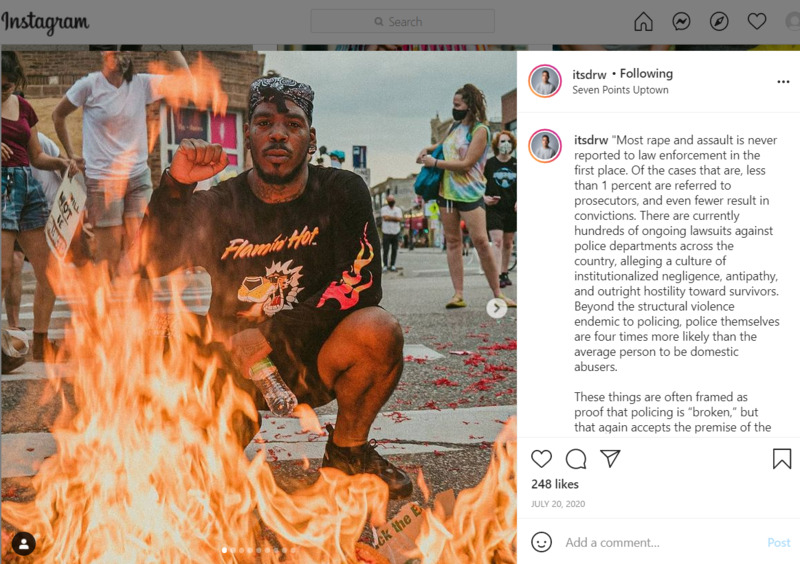 2020-07-20
2020-07-20Photos from Justice for Womxn Lost To State Violence protest
"Most rape and assault is never reported to law enforcement in the first place. Of the cases that are, less than 1 percent are referred to prosecutors, and even fewer result in convictions. There are currently hundreds of ongoing lawsuits against police departments across the country, alleging a culture of institutionalized negligence, antipathy, and outright hostility toward survivors. Beyond the structural violence endemic to policing, police themselves are four times more likely than the average person to be domestic abusers. These things are often framed as proof that policing is “broken,” but that again accepts the premise of the police on their own terms. Gender-based violence enabled by and within the criminal legal system is by design, and it is inseparable from the way that “crime” itself is construed: racialized, atomized, and alienated from broader social problems. Far from being protected, it’s under the guise of “fighting crime” that Black women, trans women, indigenous, undocumented, and poor women have been subjected to a system of violent policing that continually exposes them to gender-based harm at the same time as it hems them into the margins of society. This system is self-protecting—it conspires to conceal the means through which it reproduces and justifies itself, making it difficult to imagine an alternative." - Isabel Cristo, The New Republic Photos from Justice for Womxn Lost To State Violence protest, July 18, 2020 -
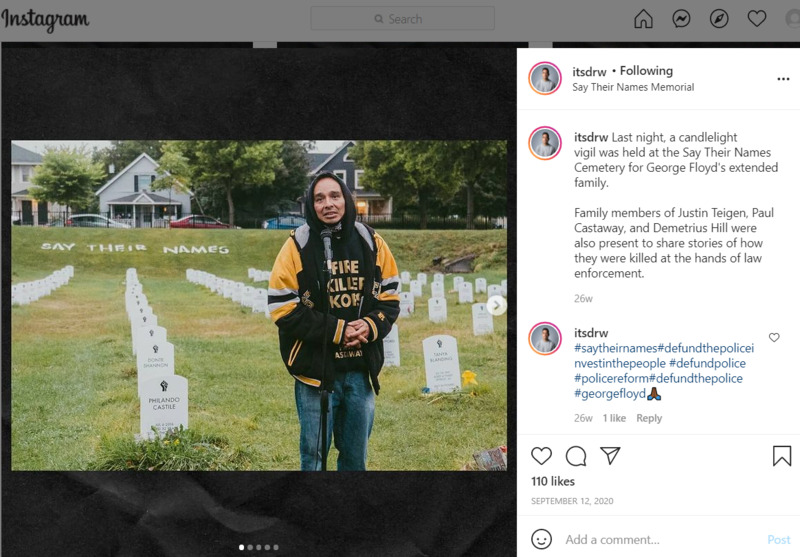 2020-09-12
2020-09-12Candlelight Vigil Held at the Say Their Names Cemetery for George Floyd's Extended Family
Last night, a candlelight vigil was held at the Say Their Names Cemetery for George Floyd's extended family. Family members of Justin Teigen, Paul Castaway, and Demetrius Hill were also present to share stories of how they were killed at the hands of law enforcement. -
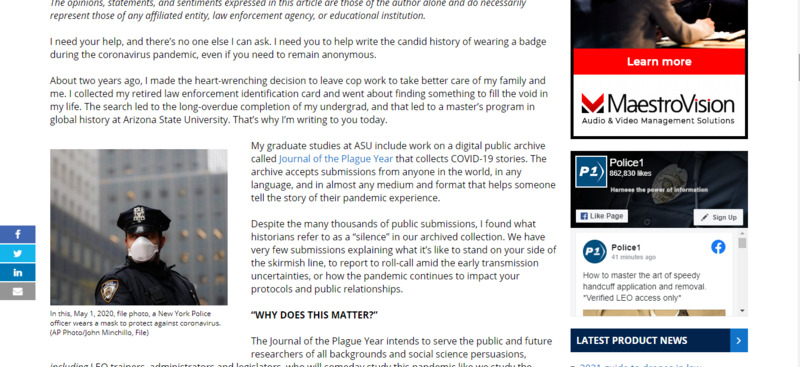 2021-03-09
2021-03-09Police1 Promotes Law Enforcement Submissions to the JOTPY COVID-19 Archive
I wrote this article for Police1 to promote law enforcement submissions to the JOTPY COVID-19 archive. At the time of this publication, Police1 enjoys approximately three million unique visits per month to its website. The site published my article on 03/09/2021, and I intend to use this article to encourage further promotion of the archive's Law Enforcement collection. -
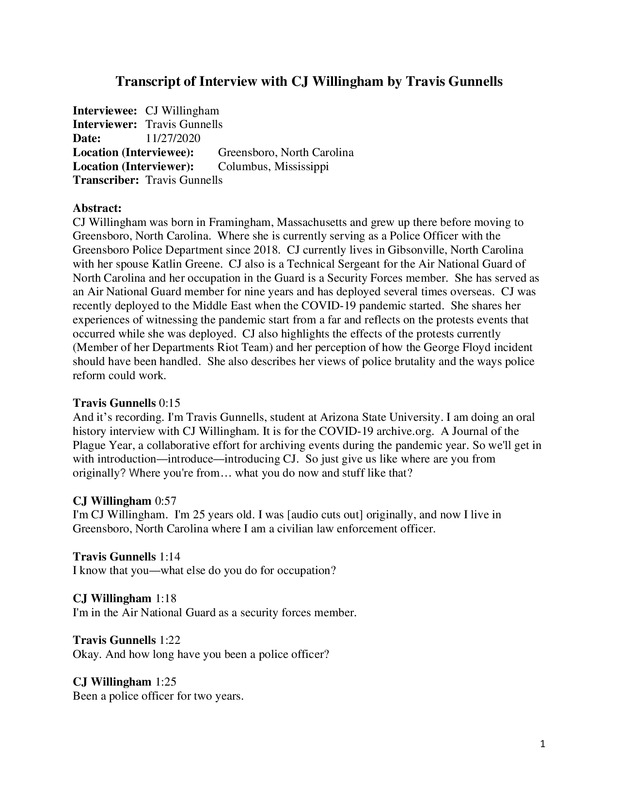 11/27/2020
11/27/2020CJ Willingham Oral History, 2020/11/27.
The Oral History interview is with CJ Willingham and she describes her experiences and views during the pandemic year. CJ gives her encounters during the initial pandemic and how the pandemic is affecting her now. She explains her perspective on more than the pandemic. CJ shares her knowledge on protests, police brutality and police reform. -
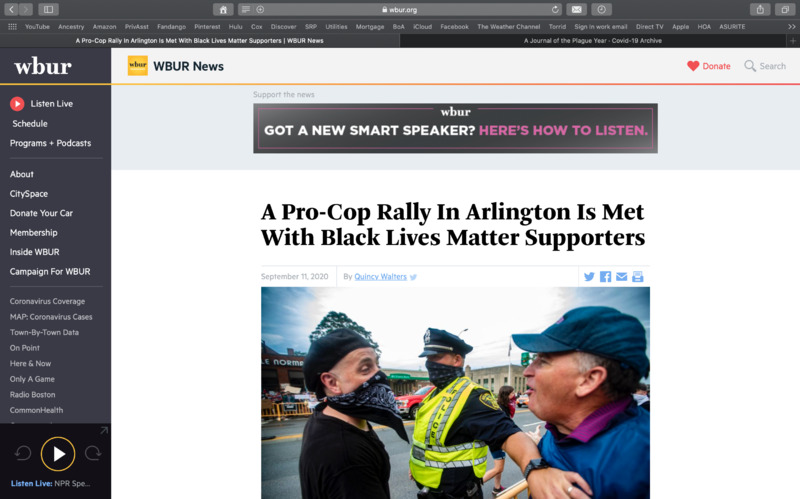 2020-09-11
2020-09-11Some do Support the Blue
With all the negative in the press, it would be easy for one to think that Law Enforcement officers are out there all alone with no support at all. This is simply not true. This article shows that there are those who support LEO's and that officers/deputies/cops are not fighting the good fight all alone. -
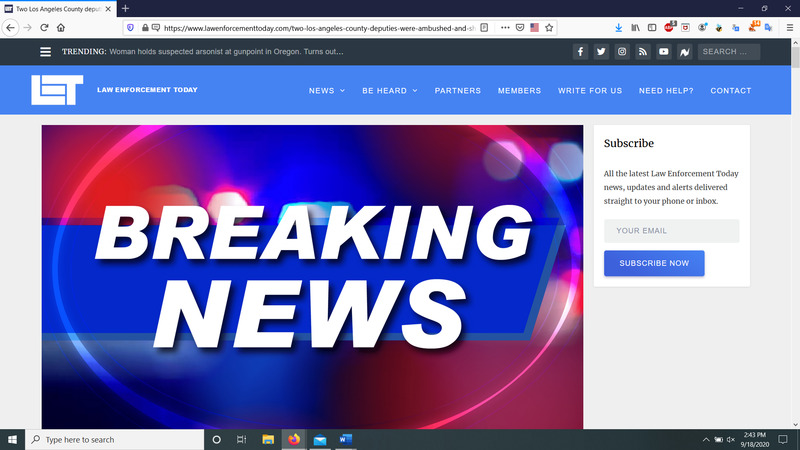 2020-09-13
2020-09-13Sad State of Affairs
I saw this article on facebook and was completely saddened by it. Those two officers were doing nothing to deserve being shot in their vehicles. And then to read that protestors were blocking the entrance to the hospital, possibly preventing ANY emergency traffic from getting in was even more disheartening. I can't even begin to think how to explain this to future generations... So. Much. Useless. Hatred. -
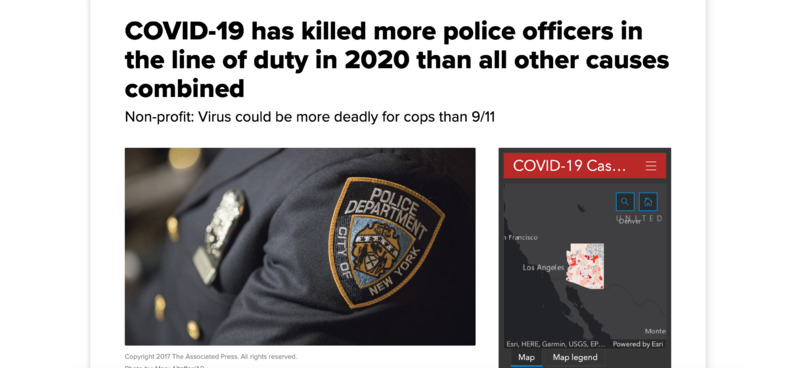 2020-09-03
2020-09-03Covid-19 has killed more police officers in the line of duty in 2020 than all other causes combined
Given the atmosphere of the year 2020 overall, it can be easy to sometimes forget that law enforcement officers are human too and they are facing the same dangers related to Covid-19 as the general public. Everyday, law enforcement officers around the world, put on their uniform for the day and head to work to protect and serve their communities, knowing that this unseen danger lurks around every corner and every call for service they go to. Their voices are often the ones that go unnoticed and unremarked so seeing an article that shines even the faintest light on the struggles they face, this year in particular, is worthy of note. -
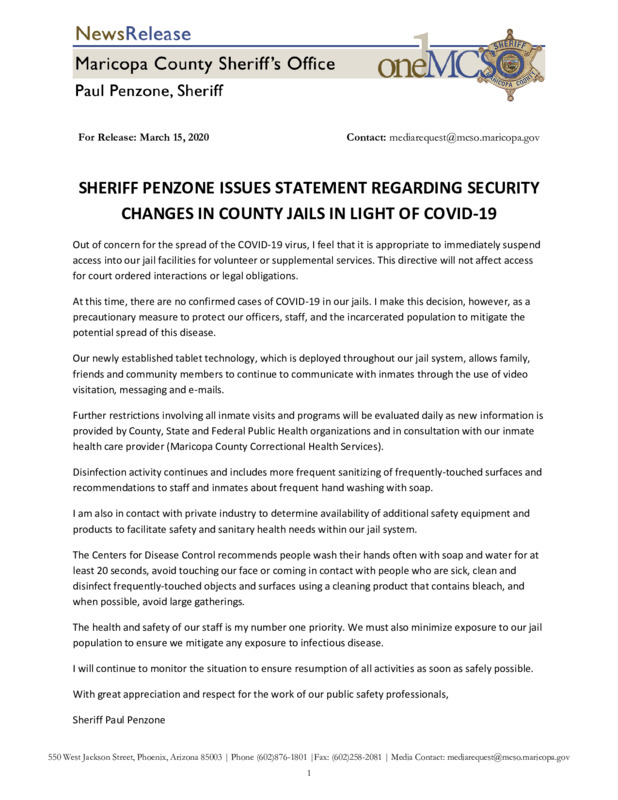 2020-03-15
2020-03-15Security Changes in Maricopa County Jails in Light of Covid-19
This is a press release that was published in March, right at the time when the US was really starting to get hit with the pandemic. At the time this was published, there were no confirmed cases of the virus in the jails, but the Sheriff's office began increasing security and limiting access in an attempt to prevent the spread of the virus within the jail population. Even at the beginning, it was evident that this would not be a flash in the pan type incident but a long lasting event that would require rethinking the 'everyday normal' to keep people safe and healthy.
